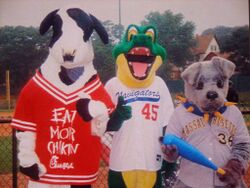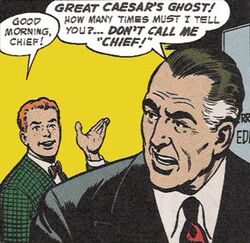We
We is one of the pronouns of the English language. It is euphemized as "the first-person plural pronoun" by those who want to avoid saying "the word we." It describes the party of the first part, the utteror, speaker or writer. Importantly, it lets the utteror claim that there are very many of him. Unless he is part of a litany or doxology chanting in unison at church, he is always wrong.
The Editorial We[edit]
The most famous use of we is in editorials. (The fame was widespread back when newspapers with editorials were widespread.) Grammar refers to this as the "Editorial We." Consider the following example of the Editorial We:
| “ | We endorse the President's re-election. | ” |
There is only one person endorsing the politician. However, crucially, he is the editor, the one with the cigar who sits in the fancy leather chair with all the brass studs.
The Editorial We gives him the chance to claim that a lot of people agree with him. This makes his opinions seem more nearly relevant. It is possible that he would compel all the employees of the newspaper to state that they agree with him, but they almost never do, and many would quit rather than say so. Several of his columnists, who hate him and his political party, can still turn a snappy phrase; and most of the pressmen promptly flip the editor the bird whenever he comes down to the plant, and would never agree that they support his man, even if they do.
An exception is a certain editor who fires his entire staff, once a year, just to prove to himself that he is in charge. On the day before he hires them all back, however, he still writes an editorial describing himself in the plural.
The Editorial We became more ridiculous by leaps and bounds in the 2010s, a decade in which the typical editor was editorializing from the basement of his parents' house.
The Infantile We[edit]
The Infantile We is another use of the first-person plural pronoun in cases that are neither first-person nor plural. Here is a typical use:
| “ | We're teething. | ” |
This is never uttered by the person who is teething.
This variety of We is crucial in mansplaining, the art of talking down to women as though they were infantile (and not just bitchy harridans). "Ah, we're at that time of the month, are we?" — likewise uttered by someone who is:
- Never in that state, or
- Seemingly always in that state.
The Community We[edit]
A related perversion of this simple word is the Community We. A community is a herd of unanimous humans, and the Community We is used to ensure unanimity among those who seem to be animous, or have animus. Thus, instead of commanding a person, "Don't touch yourself there in public!" the community activist says, "We don't touch ourselves there in public!" though the activist touching herself there in public has never been an issue. This turns a negative command into a positive notion that, by exercising a bit of self-control, the young wanker can gain community acceptance.
A notable offshoot of the Community We is the Valley We. It goes, "All-of-my-friends-and-I" and is a single word.
Wee[edit]
The pronoun is not to be confused with the word wee, which means "diminuitive." However, if the editor should write, "Wee endorse the President's re-election," the reader would be entitled to take him less seriously, even if the President claimed to be for "the little guy." Wee actually endorsed the candidacy of Michael Dukakis.
Wee wee[edit]
Wee wee, unlike words in India like Sri sri that amplify their meaning when doubled, does not mean that the utteror is even more numerous, or even more diminuitive. It is a reference to his penis — a term he learned at about the age of three. Crucially, this formulation occurs in a wee number of editorials.
An exception to this is in Paris, where it is spelled oui oui, it does amplify its meaning when doubled, and a lady should never use the expression in discussions regarding someone's penis unless she is trained in the tongue.
Ree[edit]
If one is from southern New Jersey near Philly, or if one is either Barney Frank or Elmer Fudd (pictured), we may be an attempt to say the word ree, except that English has no such word. The boss, however, may call you into his office to issue a response "in we, your wequest for a waise."


